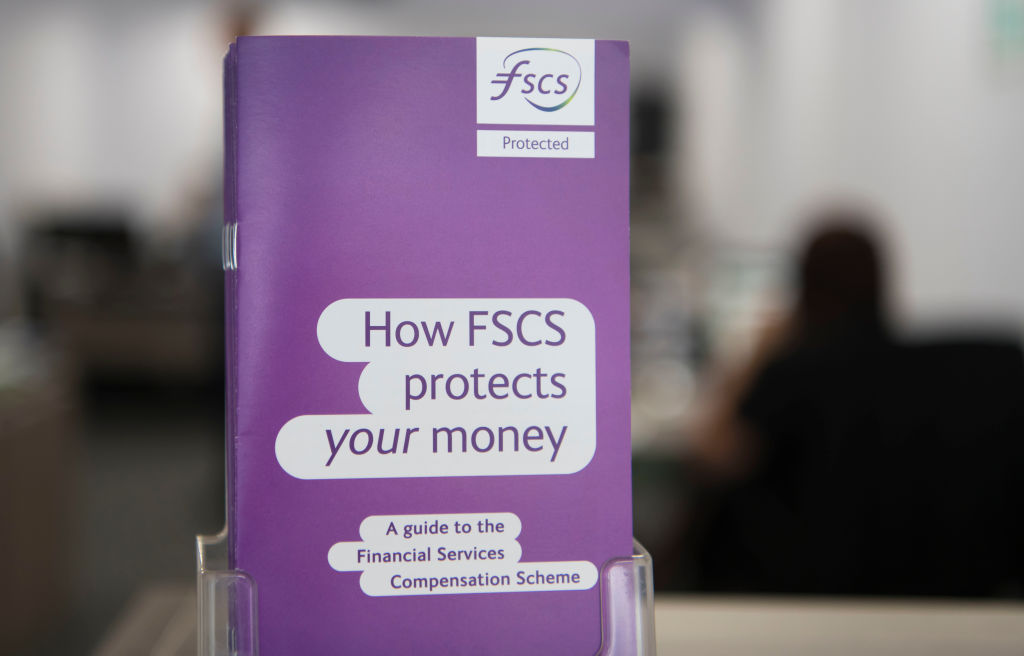What is the FSCS and how does it protect your savings and investments?
The Financial Services Compensation Scheme (FSCS) provides compensation for customers if a financial institution goes out of business. What is the limit and how does the scheme work?


Get the latest financial news, insights and expert analysis from our award-winning MoneyWeek team, to help you understand what really matters when it comes to your finances.
You are now subscribed
Your newsletter sign-up was successful
Want to add more newsletters?

Twice daily
MoneyWeek
Get the latest financial news, insights and expert analysis from our award-winning MoneyWeek team, to help you understand what really matters when it comes to your finances.

Four times a week
Look After My Bills
Sign up to our free money-saving newsletter, filled with the latest news and expert advice to help you find the best tips and deals for managing your bills. Start saving today!
You may have heard of the FSCS, but might not be so sure how it affects you.
The Financial Service Compensation Scheme protects your savings and investments if a financial services firm like a bank, building society, insurer or stockbroker fails.
It was set up by the government in 2001 and is funded by the financial services industry. The scheme is independent, free to use and pays out compensation to consumers owed it.
MoneyWeek
Subscribe to MoneyWeek today and get your first six magazine issues absolutely FREE

Sign up to Money Morning
Don't miss the latest investment and personal finances news, market analysis, plus money-saving tips with our free twice-daily newsletter
Don't miss the latest investment and personal finances news, market analysis, plus money-saving tips with our free twice-daily newsletter
There is a limit to how much the FSCS will pay out though, which will rise on 1 December.
How does the FSCS work for savers?
You will be covered by the scheme if you hold money with a FSCS-protected bank, building society or credit union.
You will usually be compensated for up to £85,000 if the institution you’re using goes bust. If you hold a joint account, this protection doubles to £170,000.
In certain circumstances, where your bank balance is temporarily high (for example, due to the proceeds from a house sale or receiving an inheritance), you may be compensated for losses of up to £1 million, for six months from when you first deposited the amount. This is done through a temporary high balance (THB) claim.
Both the £85,000 and £1 million limits apply “per financial institution”, which applies to different bank and building society brands that operate under the same licence. For example, First Direct and HSBC operate under the same bank licence, and are, therefore, protected by the same FSCS coverage limit.
So if you have, say, a cash ISA with HSBC and a regular saver with First Direct, your total compensation for funds held across both banks will be capped at £85,000.
While most people will be covered by this limit, if you have substantial cash savings, you may want to spread your money between accounts at more than one financial institution.
Bank and pension provider collapses might be relatively rare, but they do happen. Having two accounts with two providers will reduce the risks of losing access to your money for whatever reason.
The FSCS recovered £56 million from failed financial institutions over 2024/25.
You can check the Financial Services Register to see if a company is authorised in the UK (and therefore protected by the FSCS).
How does the FSCS work for investors?
If your stockbroker, financial adviser or investment firm goes out of business and there is a shortfall in client assets – in other words, money that should be in a segregated account turns out not to be – then the FSCS will pay out up to £85,000 per client (not per account) to top up whatever can be recovered.
Note that the FSCS protection varies depending on the type of product, and not all investment products are protected. You can use the FSCS investment protection checker to see if your product is covered.
For example, if a stockbroker owes you £70,000, but you only get back £40,000, you should be entitled to another £30,000 from the FSCS. However, if you have two accounts with the same broker holding £70,000 and £120,000 respectively, and you get back £40,000 for each, the FSCS will pay you a maximum of £85,000 leaving you £25,000 short.
You can choose to make an FSCS claim after getting some money back from the insolvent company or before it pays out anything. When you make a claim, the FSCS takes over your claim against the company.
Other financial products the FSCS covers
Although most commonly known for stepping in when banks and investment firms fail, the FSCS provides compensation for customers across a wide range of financial services.
This covers funeral plans and life insurance to mortgages and self-invested personal pensions (SIPPs). The full list of financial services covered is:
- Banks and building societies
- Mortgages
- PPI
- Credit unions
- Insurance
- Debt management
- Pensions
- Investments
- Funeral plans
Is the £85,000 limit increasing?
Yes. The £85,000 threshold, which has been fixed since 2017, is rising by 41% to £120,000 on 1 December. The threshold for those with joint accounts will rise to £240,000.
The limit for temporary high balance (THB) claims is also being hiked from £1 million to £1.4 million. Both the limits have been increased to account for inflation.
The changes come following a consultation launched by the Prudential Regulation Authority (PRA) earlier this year.
Sam Woods, chief executive of the PRA, said: “This change will help maintain the public’s confidence in the safety of their money.
“Public confidence supports the strength of our financial system.”
For firms that fail between now and 30 November, the protection limit will stay at £85,000 per person while the THB limit remains at £1 million.
Are you eligible for FSCS compensation?
In order to claim compensation under the FSCS, you need to meet certain criteria set by the Financial Conduct Authority (FCA) and the PRA.
Here’s a brief rundown of the eligibility criteria:
- The firm needs to be a failed firm for you to receive payment for a claim against it.
- The firm needs to be authorised by either the FCA or the PRA, or any predecessor of these regulators at the time you were involved in business with it.
- You must have suffered a financial loss, and the firm must owe you a “civil liability” such as a breach of certain rules or negligence so that if you take the firm to court, the ruling would be in your favour.
- Each product has slightly different criteria.
Check if your financial product or service is protected, and what the compensation limits are.
How to claim for FSCS compensation
If you think you have a compensation claim against a failed financial services company under the FSCS, the first step is to check your eligibility using the FSCS’s online tool. It’s free and relatively simple.
After this, you need to gather all the necessary documents. You can find out which documents are required for each kind of claim, such as investment, mortgage advice or endowment, pensions, PPI, structured deposit or whole-of-life insurance claims, on the FSCS website.
For most claims, you require two forms of identification, documents related to the product or service you’re claiming for, and your bank details, so that the compensation can be paid into your account if approved.
If you’re claiming under the temporary high balances rule, you will need to provide evidence of any of the following that apply to your case:
- A property sale receipt or agreement
- A court judgment
- A will
- A letter from an insurer regarding an insurance payout
- A letter from a lawyer, conveyancer, mortgage provider, former employer, or pension trustees
- Court orders
- Probate/letters of administration
- Death/marriage certificate
- Land Registry and HMRC records
Get the latest financial news, insights and expert analysis from our award-winning MoneyWeek team, to help you understand what really matters when it comes to your finances.

Oojal has a background in consumer journalism and is interested in helping people make the most of their money.
Oojal has an MA in international journalism from Cardiff University, and before joining MoneyWeek, she worked for Look After My Bills, a personal finance website, where she covered guides on household bills and money-saving deals.
Her bylines can be found on Newsquest, Voice.Cymru, DIVA and Sony Music, and she has explored subjects ranging from politics and LGBTQIA+ issues to food and entertainment.
Outside of work, Oojal enjoys travelling, going to the movies and learning Spanish with a little green owl.
- Ruth EmeryContributing editor
- Sam WalkerWriter
-
 MoneyWeek Talks: The funds to choose in 2026
MoneyWeek Talks: The funds to choose in 2026Podcast Fidelity's Tom Stevenson reveals his top three funds for 2026 for your ISA or self-invested personal pension
-
 Three companies with deep economic moats to buy now
Three companies with deep economic moats to buy nowOpinion An economic moat can underpin a company's future returns. Here, Imran Sattar, portfolio manager at Edinburgh Investment Trust, selects three stocks to buy now
